I am so glad this recipe is finally live because I’ve made it 3 times since Linley came up with it. I’m always looking for new ways to use ground beef and this Korean-inspired recipe is next level — especially served next to a boat load of veggies and white rice.
So simple yet so good, this Korean Ground Beef is a delight for the taste buds. Lean ground beef simmers in a flavorful sauce made with Asian-inspired favorites like soy sauce, gochujang, brown sugar, and ginger and is then served alongside a delicious red pepper salad and white rice.
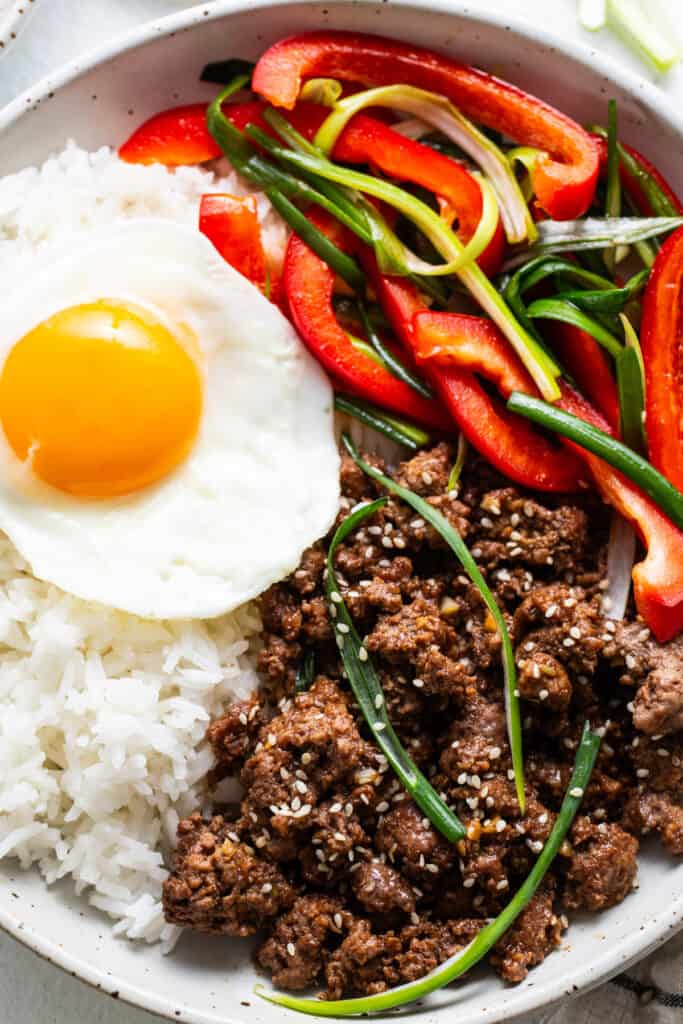
Sometimes it’s hard to get out of the ground beef rut and make anything other than tacos, spaghetti, or meatloaf, but now that my fam tasted this this Korean ground beef recipe, it has become a regular part of our easy dinner rotation!
It’s an explosion of flavors in every bite, and it only takes about 35 minutes to make.
Start by making the red pepper salad, then the sauce. Next cook your beef, eventually adding the sauce. Then thicken with cornstarch, add your toppings, and serve! Easy peasy 👏🏻 👏🏻 👏🏻
What’s In Korean Ground Beef
- Rice vinegar: We use rice vinegar in both the salad and the sauce. It adds a delicious tangy flavor to the overall dish.
- Brown sugar: Sweet brown sugar gives this dish a hint of sweetness, balancing out the heat from the gochujang.
- Sesame oil: Nutty and fragrant, sesame oil adds depth of flavor to this easy ground beef recipe.
- Gochujang: Gochujang is a staple in Korean cooking and adds a spicy kick to this dish.
- Fresh vegetables: Red bell pepper and green onion are used in the salad, while garlic and ginger are used in the sauce to flavor the beef.
- Soy sauce: Soy sauce is used for both the salad dressing and in the beef sauce, adding a savory umami flavor.
- Ground beef: You’ll need a pound of ground beef, preferably lean, to give this easy recipe an even bigger protein boost.
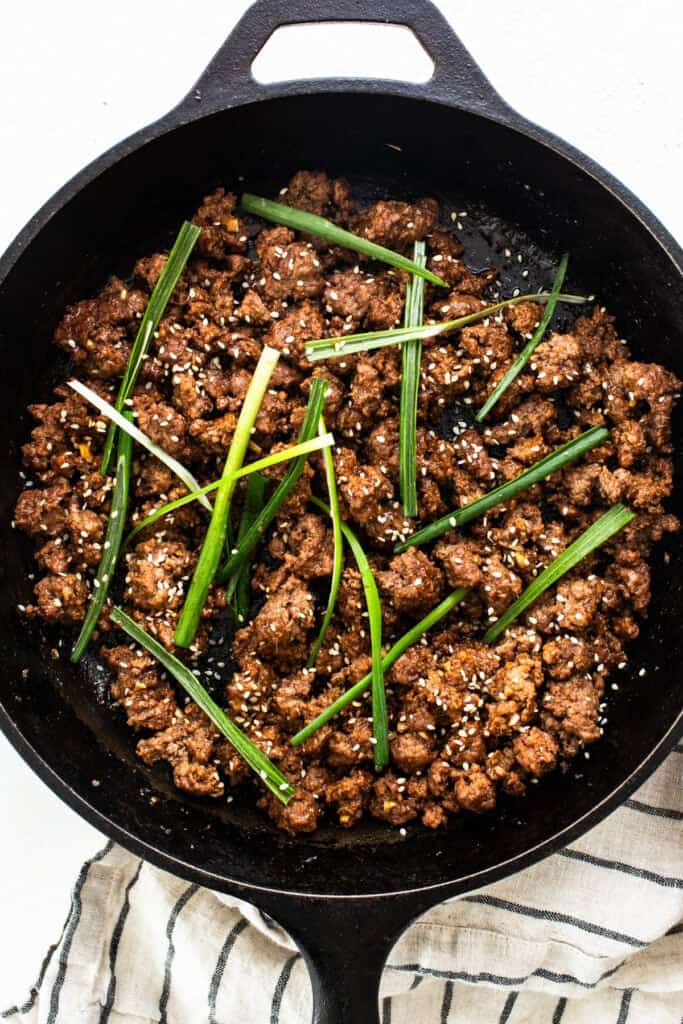
Get our Top 10 5-Star Recipes!
Join our email list for new recipes and BONUS: get our top 10 ⭐️⭐️⭐️⭐️⭐️ recipes e-book!
Need to switch the ingredients up?
- Spice novice: If you are sensitive to spice, add half the amount of gochujang sauce.
- Gochujang who?: If you don’t have gochujang sauce, you can substitute sriracha, but it will change the overall flavor of the dish.
- Honey: You can always replace the brown sugar with honey if you prefer!
- Fish? No thanks: The fish sauce adds a delicious umami flavor to the sauce, and a little goes a long way. Feel free to omit it if you are not excited about fish sauce.
- Fried egg: Serve your Korean ground beef over a bed of white rice and top with a fried egg for an extra protein boost.
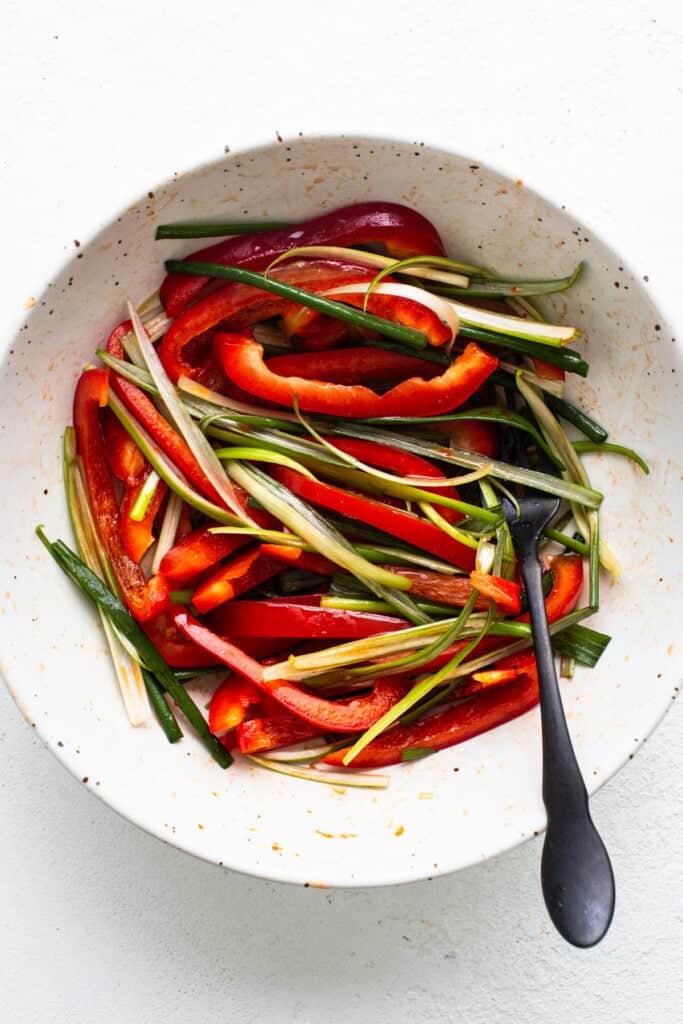
Do I have use cornstarch in the sauce?
Don’t leave out the cornstarch, as it helps thicken the sauce and gives it a glossy finish.
Can I make this ahead of time?
To make ahead, you can prepare the salad and sauce ahead of time, then simply cook the beef and combine when ready to eat.
What should I serve this Korean ground beef over?
Serve over white rice, or use it as a filling for lettuce wraps or tacos for a fun twist!
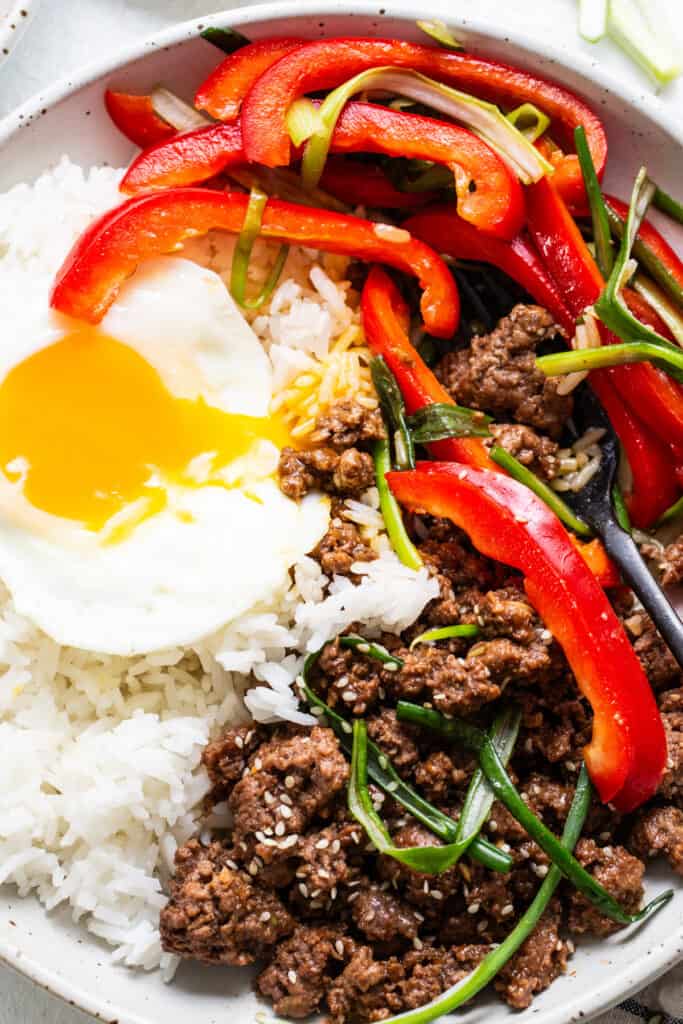
Is this an authentic Korean recipe?
No, this recipe is not a traditional Korean beef recipe. It is inspired by Korean flavors and uses some staple ingredients in Korean cuisine, but it has been adapted to be easier and quicker for home cooks to make.
For instance, we don’t use actual Korean beef bulgogi, which is thinly sliced beef marinated in a sweet and savory sauce. Instead, we use ground beef for a more budget-friendly option that still has the flavors of beef bulgogi.
For some seriously good authentic Korean recipes, we recommend checking out Korean Bapsang or Maangchi!
How to Store Leftover Ground Beef
Store any leftovers in an airtight container in the fridge for up to 4 days.
Email Me this Recipe
Share your email, and we’ll send it straight to your inbox. Plus, enjoy weekly doses of recipe inspiration as a bonus!
“*” indicates required fields
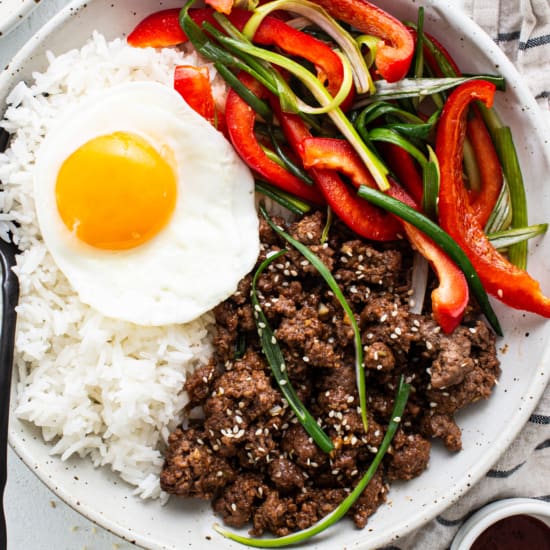
Korean Ground Beef Recipe
This Korean ground beef is easy to make and packed with flavor! Made with Korean staples like spicy gochujang, savory soy sauce, and sweet brown sugar, it’s a great way to switch up your ground beef dinner routine!
Prep:20 minutes
Cook:15 minutes
Instructions
-
First, make the salad. Add the rice vinegar, brown sugar, sesame oil, gochujang, and salt to a medium bowl and whisk until the sugar is dissolved. Add the red pepper and green onions and toss to coat. Transfer to the refrigerator.
-
Next, whisk together the soy sauce, rice vinegar, sesame oil, garlic, brown sugar, fish sauce, gochujang, and ginger in a separate bowl. Set aside.
-
Heat a large skillet over medium/high heat. Add the ground beef and cook until almost fully cooked, 4-6 minutes.
-
Pour the soy sauce mixture over the beef and reduce the heat. Simmer for 3-4 minutes.
-
When the beef is cooked, move the beef to one side of the skillet and the sauce to the other. Sprinkle the cornstarch into the sauce and whisk vigorously until the cornstarch dissolves.
-
Stir the sauce and beef back together and gently simmer over medium heat until the sauce thickens.
-
Remove from the heat and top with sesame seeds and green onions.
-
Serve the beef alongside the red pepper salad and white rice.
Tips & Notes
- If you are sensitive to spice, add half the amount of gochujang sauce.
- If you don’t have gochujang sauce, you can substitute sriracha, but it will change the overall flavor of the dish.
- Option to replace the brown sugar with honey.
- The fish sauce adds a delicious umami flavor to the sauce, and a little goes a long way. Feel free to omit it if you are not excited about fish sauce.
- Nutrition information does not include rice.
Nutrition facts
Calories: 373kcal Carbohydrates: 8g Protein: 22g Fat: 28g Fiber: 1g Sugar: 4g
Photography: photos taken in this post are by Ashley McGlaughlin from The Edible Perspective.

